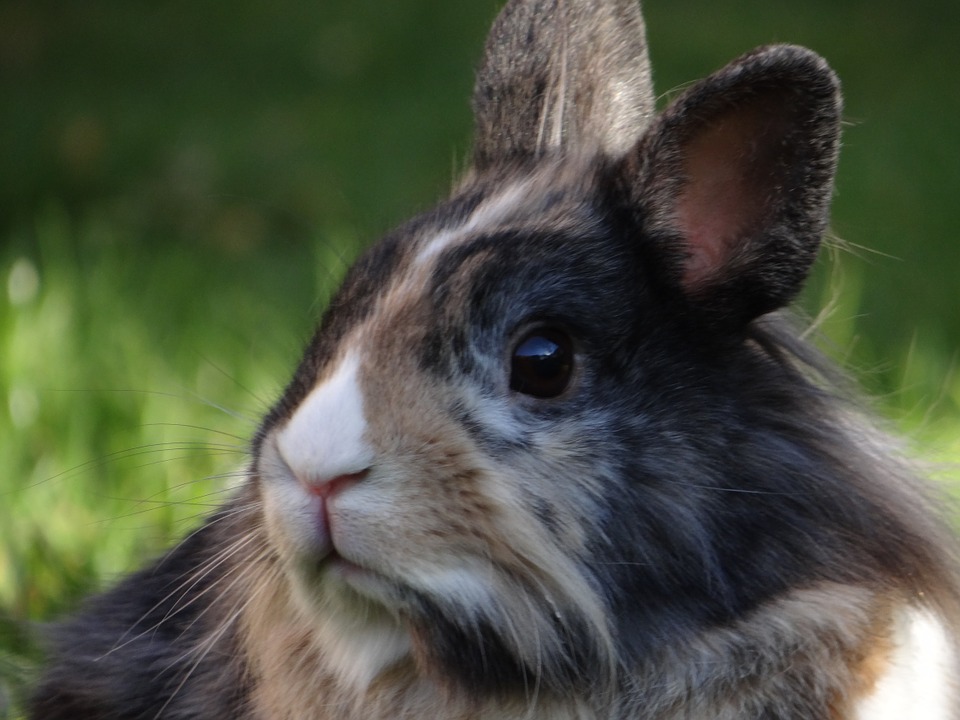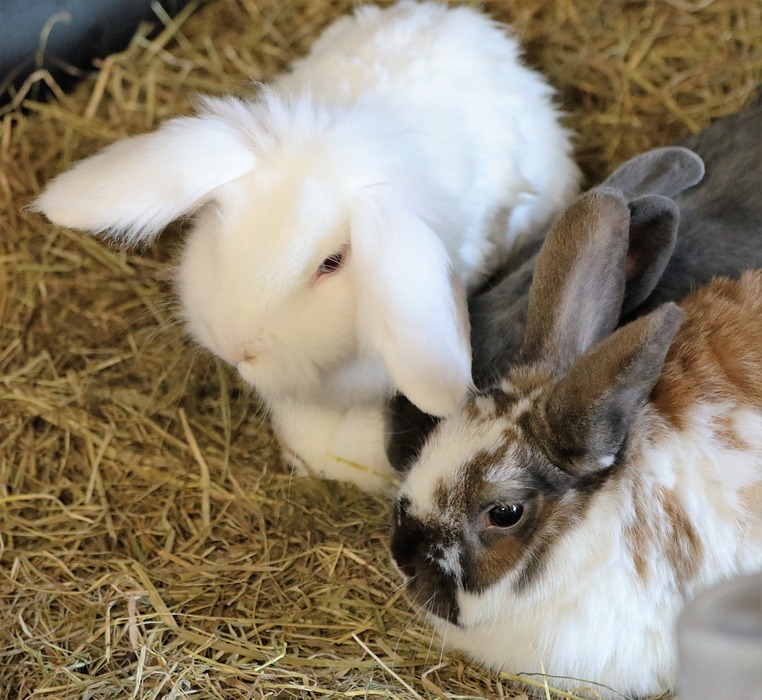This comprehensive guide explores the fascinating world of rabbit pregnancy, providing detailed information to help you recognise the signs, understand the gestation process, and ensure the well-being of both the mother and her litter. We'll cover everything from the subtle changes in behaviour to the physical signs that indicate a bun in the oven, along with essential tips for providing optimal prenatal care.
Part 1: The Wonderful World of Rabbit Reproduction

1.1. The Unique Nature of Induced Ovulation
- Unlike many mammals, rabbits are induced ovulators, meaning they release eggs only after mating.
- This unique characteristic ensures that ovulation occurs only when there's a potential for fertilisation, maximising the chances of successful reproduction.
1.2. The "Kindling" Process: From Mating to Kits
- The term "kindling" refers to the birth process in rabbits, a beautiful culmination of gestation.
- Following successful mating, the gestation period, or pregnancy, begins, lasting approximately 31 days.
1.3. Factors Influencing Gestation Duration
- While the average gestation period is 31 days, it can vary slightly between 28 and 35 days.
- The litter size, individual rabbit health, and environmental factors can influence this duration.
Part 2: Early Signs: Subtle Clues of a Budding Bun-dle

2.1. Behaviour Changes: A Peek into the Rabbit's Mind
- In the initial stages, pregnancy signs might be subtle, requiring keen observation.
- Behavioural changes often precede physical changes and can offer valuable insights.
2.2. Increased Appetite and Thirst: Nurturing the Growing Life Within
- Pregnant rabbits will often experience a noticeable increase in their desire for food and water.
- This reflects the increased nutritional demands of their body and the developing kits.
2.3. Nesting Instinct: A Mother's Natural Preparation
- As the due date approaches, the mother rabbit's nesting instinct kicks in, prompting her to prepare a safe haven for her litter.
- This might involve collecting soft materials like hay, straw, or even shredded paper, creating a cozy nest within her hutch or enclosure.
2.4. Increased Rest and Decreased Activity: Conserving Energy for Motherhood
- Pregnant rabbits often become more lethargic and may spend more time resting as the gestation progresses.
- This is a natural response to the growing weight and demands placed on their bodies.
Part 3: Physical Indicators: The Body's Story of Pregnancy
3.1. Weight Gain: A Gradual but Visible Change
- A progressive weight gain is a common sign of pregnancy, particularly as the kits grow larger.
- However, it's essential to remember that other factors can contribute to weight gain, so it's best to consider other signs as well.
3.2. Enlarged Abdomen: A Growing Bun-dle
- As the pregnancy progresses, the rabbit's abdomen will become noticeably larger, especially in the later stages.
- This is a clear indication of the kits developing within the womb.
3.3. Swollen Mammary Glands: Preparation for Nursing
- Pregnant rabbits experience significant enlargement of their mammary glands, located on their belly and chest.
- These glands become more pronounced and often take on a reddish hue, signifying their readiness for nursing.
3.4. Vulva Changes: A Sign of Hormonal Transformation
- The vulva of a pregnant rabbit may appear slightly swollen and have a pinker colour than usual.
- These changes are due to the hormonal shifts associated with pregnancy.
Part 4: Expert Confirmation: Veterinary Assistance
4.1. Palpation: A Gentle Examination for Pregnancy
- Palpation, a gentle physical examination of the abdomen, can be performed by an experienced veterinarian to confirm pregnancy.
- This procedure involves carefully feeling for the presence of developing kits in the uterus.
4.2. Accuracy and Timing: The Ideal Window for Palpation
- Palpation is most accurate around 14 days into the pregnancy, when the kits are large enough to be detected.
- It's crucial to avoid attempting palpation yourself, as it can be uncomfortable for the rabbit and potentially harmful to the developing kits.
4.3. Ultrasound: Advanced Imaging for Detailed Insight
- Ultrasound is a more definitive method for confirming pregnancy in rabbits, offering a clearer picture of the developing kits.
- It allows for accurate visualisation of the kits, revealing information about their number and health.
4.4. Veterinary Expertise: Ensuring Safety and Accuracy
- Ultrasound examinations should only be performed by a qualified veterinarian with experience in rabbit care.
- This procedure is non-invasive and generally safe for both the mother and kits.
Part 5: Prenatal Care: Providing for a Healthy Pregnancy
5.1. Balanced Diet: Fueling Growth and Development
- A balanced diet is crucial for a pregnant rabbit's health and the development of her litter.
- A diet rich in hay, fresh vegetables, and a small amount of rabbit pellets provides essential nutrients.
5.2. Fresh Water: Hydration for Mother and Kits
- Ensure your rabbit has access to fresh water at all times, as she will need to drink more to stay hydrated during pregnancy.
5.3. Adequate Space: Room to Grow and Nest
- Provide a spacious enclosure or hutch to accommodate your rabbit's growing size and her nesting behaviour.
5.4. Routine Veterinary Check-ups: Monitoring Health and Well-being
- Regular veterinary check-ups are essential throughout pregnancy to monitor the rabbit's health and ensure the litter's well-being.
Part 6: Kindling: The Arrival of New Life
6.1. Signs of Approaching Labour: The Rabbit's Preparations
- The rabbit may become restless and agitated as labour approaches, displaying a change in behaviour.
- She may also exhibit increased nesting behaviour and panting.
6.2. The Labour Process: A Natural Miracle
- Labour typically lasts for a few hours and involves multiple stages.
- The rabbit will usually deliver kits in quick succession, demonstrating her remarkable ability to nurture life.
6.3. Postpartum Care: Supporting the Mother and Litter
- It's crucial to provide adequate support and care for the mother and her litter after delivery.
- This includes ensuring that the mother has access to plenty of food, water, and a safe and quiet environment.
Part 7: FAQs: Addressing Common Questions
7.1. How long does a rabbit stay pregnant?
- The average gestation period for a rabbit is around 31 days, but it can range from 28 to 35 days.
7.2. Can I tell if a rabbit is pregnant by her belly?
- While an enlarged abdomen is a common sign of pregnancy, other factors can contribute to weight gain, so it's best to consider other signs as well.
7.3. Is it safe to handle a pregnant rabbit?
- Gentle handling is usually fine, but it's best to avoid any unnecessary stress or disturbances during pregnancy.
7.4. What should I do if my rabbit is pregnant?
- Consult your veterinarian for advice on proper prenatal care, including diet, housing, and routine check-ups.
7.5. Should I separate my pregnant rabbit from other rabbits?
- It's usually best to separate a pregnant rabbit to provide her with a safe and quiet environment for nesting and delivery.
7.6. What should I do if my rabbit is having trouble giving birth?
- Contact your veterinarian immediately if you notice any signs of distress during labour or if the rabbit is unable to deliver her kits successfully.
Everyone is watching
-

Do Rabbits Lay Eggs? (The Surprising Truth)
OTHER TYPES OF PETSThis article will unravel the common misconception that rabbits lay eggs, exploring the fascinating world of r...
-

What's a Group of Rabbits Called? (A Comprehensive Guide)
OTHER TYPES OF PETSThis article delves into the fascinating world of rabbits, exploring the various terms used to describe a grou...
-

Can Rabbits Eat Grapes? A Guide to Safe Rabbit Treats
OTHER TYPES OF PETSThis comprehensive guide will explore the safety and suitability of grapes for rabbits, providing detailed inf...
-

Predators That Hunt Rabbits: A Guide to Natural Enemies
OTHER TYPES OF PETSI've always been fascinated by the circle of life, that delicate dance between predator and prey. Growing up ...
-

Are Rabbits Nocturnal Animals?
OTHER TYPES OF PETSThe question of whether rabbits are nocturnal animals is a fascinating one, with a surprisingly complex answer...
